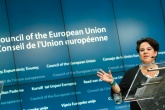Packaging industry calls on EU to adopt full lifecycle approach
 The role of packaging in helping to ensure sustainable resource use must not be undermined by the Circular Economy Package, a group of 36 national and European trade associations has warned while presenting a set of recommendations for upcoming European legislative amendments.
The role of packaging in helping to ensure sustainable resource use must not be undermined by the Circular Economy Package, a group of 36 national and European trade associations has warned while presenting a set of recommendations for upcoming European legislative amendments.
European packaging body EUROPEN, the Confederation of European Paper Industries (CEPI), European container glass federation FEVE and the British packaging council INCPEN are among the associations representing a range of sectors from throughout the packaging value chain, including consumer goods brands, packaging producers, material producers and extended producer responsibility (EPR) organisations, to have made the set of recommendations.
Talk of the Circular Economy Package has cooled in recent months during the European Parliament’s summer recess (and while the UK has begun to what Brexit will mean for its interaction with European legislation and policy). However, the set of regulatory reforms and action plans that will aim to stimulate a more resource-efficient way of living and conducting business is still being debated within the three European institutions (Parliament, Council and Commission). Once all three have sealed their positions, the package will go to trilogues to finalise the European legislative position.
Therefore, there is still time to make amendments, and the 36 associations have called for the legislative proposals to consider lifecycle approaches, incentivise economies of scale and take into account all levels of value chains, noting the different functional needs, supply and demand realities of each.
Packaging plays ‘central role’
As resource efficiency has become more of a publicly-recognised issue, packaging – one of the most conspicuous contributors to waste generation – often takes the brunt of criticism. However, the organisations want the key functionalities of packaging like the role it can play in protecting resources invested in the packaged product throughout the supply chain to be taken into account, and not just end-of-life considerations.
“Our proposals aim at reinforcing the current EU policy framework, preserving the environment and re-launching European competitiveness, quality jobs and sustainable growth”, said Martin Reynolds, Crown Europe and EUROPEN Chairman.
“Packaging plays a central role in a circular economy by optimising resource use and minimising product waste. We call on the EU to recognise its cross-sectoral function by preserving a full lifecycle approach in legislation, since packaging is intrinsically connected to the product it contains and its value chain.”
To do this, it is cautioning against measures that set restrictive requirements for packaging (e.g. single-use/multiple use, recyclable or non-recyclable, bio-based and/or biodegradable, recycled content, single-serve/dose) without regard to the impact on the lifecycle of packaged products themselves.
Recommendations
The recommendations put forward by the group of associations today (30 August) call on the European Council and Parliament to ensure amendments to the Waste Framework Directive and Packaging and Packaging Waste Directive:
- safeguard the free movement of packaging and packaged goods in the EU internal market;
- enshrine a full lifecycle approach;
- strengthen the EU legal framework for EPR for used packaging;
- avoid legal requirements that mandate additional packaging reuse systems alongside existing EPR systems and avoid related national measures that will distort the internal market; and
- set realistic and achievable packaging ‘preparing for reuse’/recycling targets based on known starting points, as well as a harmonised and clarified measurement point and calculation methodology.
Robust, evidence-based framework
Virginia Janssens, EUROPEN Managing Director, said of the recommendations: “Safeguarding the internal market is essential to give companies in the packaging value chain the confidence to invest and innovate to meet the environmental, growth, and competitiveness objectives of the Circular Economy Package. We must avoid measures that could lead to divergent national packaging design requirements, as these would create de facto trade barriers for all packaged goods.
“Instead, we need a robust, evidence-based European framework that sets ambitious yet realistic targets, is based on a harmonised calculation method and enables operators to build on over two decades of success in growing packaging recycling rates through efficient, transparent and fair extended producer responsibility schemes.”









